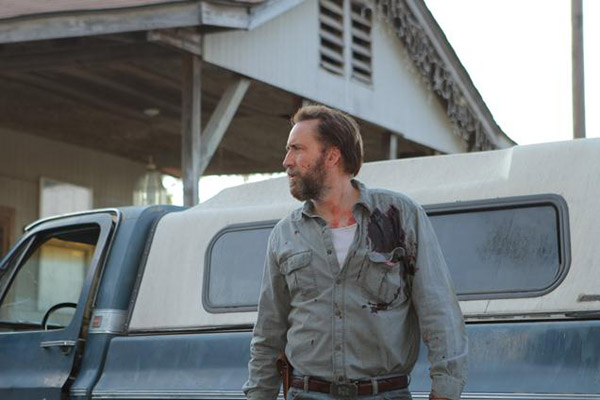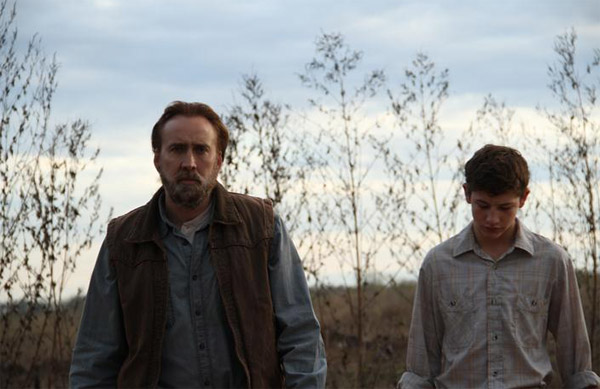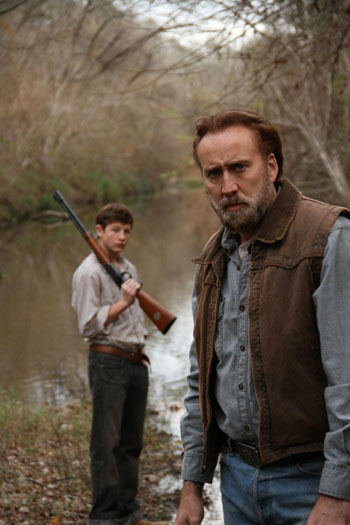“Joe unites a pair of talents somewhat on the comeback trail,” proposes Oliver Lyttelton at the Playlist. “David Gordon Green’s once-lofty critical reputation—the filmmaker was once lauded as a successor to Terrence Malick—took something of a hit after a left-turn into poorly-received studio comedies like Your Highness and The Sitter, but this year’s Prince Avalanche seemed to mark a return to the lo-fi indies he made his name with. Meanwhile, Nicolas Cage’s status as a major star and as one of his generation’s most acclaimed actors has been threatened in recent years by a series of low-rent pictures, seemingly taken for the paycheck alone, which have seen the actor increasingly descend into either self-parody, or deep boredom…. But Joe, an adaptation of the novel by Texan favorite Larry Brown…, is by some distance the strongest work either have done in a while. It’s not exactly doing anything new, but it’s a muscular and textured piece of work that shifts assuredly through tones and genre, and features a rich and rewarding performance from Cage, and another excellent turn from his young co-star Tye Sheridan (The Tree of Life, Mud).”
“Joe superficially recalls Green’s Southern-gothic thriller Undertow,” suggests Variety‘s Justin Chang, “although it also bears some resemblance to his little-seen 2007 drama Snow Angels with its multi-character focus, incongruous comic touches and climactic eruption of violence. As usual with the director’s artier excursions, there’s a deliberate unevenness at work here, an off-center quality to the storytelling that intrigues as well as frustrates, as the film often willingly suspends traditional narrative satisfactions for the sake of color and atmosphere.”
Writing at Thompson on Hollywood, Matt Mueller finds Joe “weighed down by dramatic inertia and lethargic pacing.” The set-up: “Cage is the titular Joe, a rough-edged bear of a man who runs an illegal tree-killing outfit (poisoning ‘the wood nobody wants’ so lumber companies can sweep in to replant saleable pine). He’s unfulfilled and drifting through life, boozing, whoring and trying to keep the lid on a vicious temper that once landed him in prison and now brings him into conflict with the local super-creep (Ronnie Gene Blevins). Into his sphere drifts 15-year-old Gary, whose itinerant family are squatting an abandoned house but who has brains and work ethic to spare. Gary quickly endears himself to Joe, who hires him for his tree-murder squad but then has to cope with another monstrous scumbag, Gary’s thieving, abusive, alcoholic father.”
“Akin to the large majority of David Gordon Green’s cinematic back catalog, Joe is about the world of men,” writes David Jenkins in Little White Lies, “men who barely flinch when they take a piece of buckshot to the gut, who lope around in faded Pantera tees, who drive with a one hand on the wheel and the other on a cold brewski. Harking back to classic westerns, much of the plot is driven by antiquated codes of honor, and the film’s scenes of violence stem from petty just desserts meted out in return for very minor humiliations.”
“Green’s regular cinematographer Tim Orr, as always, does impeccable work, elegantly juxtaposing images of natural beauty with harshness and squalor in a visual field of rich dark tones,” writes David Rooney in the Hollywood Reporter. “Pace-wise, the sinewy drama seems a touch too long and occasionally tends to idle where genre conventions dictate a steadier build, but David Wingo’s score maintains a suitably ominous mood.”
Green’s “take on the moral, financial and physical issues ordinary working types struggling to get by in the underbelly of America is striking,” finds Screen‘s Mark Adams. “It is made all the more evocative by the use of several non-professional actors in key roles who were found in Austin, Texas, and adds much to the tone and vibrancy of the film.”
Joe‘s competing in Venice and will be a Special Presentation in Toronto.
Updates, 9/1: Here’s “an ugly little movie, supposedly redeemed by its ultimate sweetness,” finds the Voice‘s Stephanie Zacharek. “I’m not buying it…. The whole thing makes Winter’s Bone look as cheerful as a Li’l Abner strip, and there’s something distastefully condescending about it. Joe’s single redeeming element is Sheridan’s performance: He’s a charismatic presence, but there’s some weight there, too. He succeeds in playing a person, not a sociological specimen. He wins you over to his side, even if you find yourself resisting everything else about the movie.”
“From its opening shot by the railroad tracks, Green’s film fairly wallows in the sights and sounds of the Mississippi margins, cooking up a movie in which locals loll about on front porches, and only break off from skinning deer in their kitchen to shoo a chicken out through the screen door,” writes the Guardian‘s Xan Brooks. “The film’s furniture may be a little familiar, but Green arranges it with confidence. If that weren’t enough, Joe also stands as a reminder of what a terrific actor Cage can be when he is able to harness and channel his wilder impulses.”
“I felt Cage and Green dutifully constricting themselves throughout Joe,” writes Guy Lodge at In Contention, “suppressing their warmer, looser instincts to serve a narrative that is serious but not quite substantial. Essentially affecting as the surrogate father-son relationship at its core is, I found myself rooting for the leads only because the film’s narrow, nuance-free story world presents no other options, steaming as it is with unyielding masculine toxicity.”
As for comparisons to Winter’s Bone and Mud, “Green’s film is their hairier, heavier-footed cousin,” writes the Telegraph‘s Robbie Collin. “[E]ven as one of Your Highness’s few defenders, I admit the film was not the best use of a promising young director’s time. Green may not have found a distinctive voice quite yet, but Joe suggests he’s getting closer.”
Update, 9/3: In a dispatch to Filmmaker, Ashley Clark focuses on “the appearance of one Gary Poulter in the role of a monstrous, booze-sodden, abusive father. I spent the entire film wondering why I’d never seen this brilliantly convincing actor before, and was startled to see a dedication to Poulter appear ahead of the final credits. As it transpires, Poulter, who died in February this year, was homeless when he was spotted by casting director John Williams at a bus-stop, and persuaded to try for the role. Details on Poulter are vague, but a cursory Google throws up a brisk obituary on a website for a Texas paper, a couple of unflattering mugshots from sites with names like ‘Busted!’ and ‘Just Mugshots,’ and, most gallingly of all, a hopeful, self-penned entry on a talent website, which reveals Poulter’s excitement at potential future roles. In some ways, Poulter’s brief, shining ascension to the spotlight (a posthumous Oscar nom is really not beyond the realms of possibility), swiftly followed by his sudden demise, somehow burnishes and mocks the so-called American dream in one fell, brutal swoop. It’s a ghoulishly appropriate parallel for Green’s dark, brooding slice of Americana.”
Update, 9/4: Writing for Cinema Scope, Alexandra Zawia argues that “any good stuff is counteracted by the redundant and pointless miserablism of the whole exercise.”
Update, 9/7: Time‘s Richard Corliss argues that “the movie belongs to Cage, in a performance that recalls why, before his megastardom, he was considered one of cinema’s most powerful and subtle actors. His eyes reflect the haunt of past crimes in Joe; his torso—large, muscular, tattooed and somehow spent—shows the wear of life on a complicated soul. Rough-hewn and sometimes too garrulous, Joe may not be quite the equal of Green’s earlier films. But it’s nicely judged and, like Joe’s bad dreams, can’t be ignored.”
Updates, 9/11: For Indiewire‘s Eric Kohn, Joe is “the very definition of a return to form” for both Cage and Green.
“The film ultimately comes together as a striking character meditation, wisely leaving much of the plot elliptical,” writes Jordan Hoffman at Film.com. “Mixing genres is one of the hardest things to do in cinema, but Joe makes it work.”
Julie Miller interviews Cage for Vanity Fair.
Update, 9/12: “Underestimating Nicolas Cage can be habit-forming,” writes Scott Tobias at the Dissolve, “but when he’s given a role like the soulful, shit-kicking troublemaker he plays in David Gordon Green’s Joe, he makes it seem like nobody else could have pulled it off. He’s never been the type to ‘disappear’ in a role, so he would never make sense as a character actor or a supporting player who isn’t explicitly tasked with upstaging the leads. So like a lot of Cage performances, his work as Joe does have a larger-than-life quality, and the other characters—and the actors who play them—are in orbit around his big, bright shining star. Yet if it’s possible to imagine, Cage brings a self-effacing quality to Joe, a difficult man with an ugly past and unstable present who’s nonetheless trying to better himself and earn some goodwill from the people who care about him.”
Updates, 9/14: “To put it indelicately, Cage gives a shit for once, and so too does his director, that reborn poet of Southern Gothic romanticism, David Gordon Green,” writes A.A. Dowd at the AV Club. “Vintage Greenisms abound: There’s ample footage of day laborers working up a sweat in the great outdoors, some dreamy slow-motion set to rhapsodic voice-over, and several presumably improvised scenes of the characters just shooting the shit…. I wish the film were less predictable, with a jagged narrative to match its editing rhythms, but there’s a wealth of life at both its center and in its margins. For Green and Cage, caring pays off.”
“Once touted as one of the most exciting indie directors, with Prince Avalanche and now Joe, David Gordon Green looks poised to reclaim that title,” writes Ryland Aldrich at Twitch. “His portrayals of human emotion in the two films are amongst the most honest and interesting of the year.”
Update, 9/17: “Cage isn’t the primary problem with this movie,” writes Wesley Morris at Grantland, “but having him in the title role—with a beard that makes him look only nominally grizzled—provides depressing proof that no one on the project seemed to know what they were doing…. I suspect Green would argue that all the grit and ugliness speak to some sort of authenticity, that there is truth here. The movie, however, wallows in preposterous domestic and emotional grime, in sickness, fatalism, and self-defeat. I didn’t care whether I was being given the truth because I also felt like I was being given cancer.”
Updates, 4/9: For David Lee Dallas, writing at Slant, Joe and Mud “are such uncanny doppelgangers that it’s difficult to believe their directors didn’t devise them as a pair. With its fairy-tale imagery and choreographed conclusion, Mud is the friendlier of the two, though it’s also more limited, full of plot contrivances and extraneous characters, making Joe look smarter and scarier by comparison. David Gordon Green finds a balance between symbolism and realism in his storytelling that allows Joe to be many things at once: a detailed character study, a Christ-haunted morality play, a journey of becoming, an elegy. Unlike Mud, it resists easy interpretation, even though both films employ a similar narrative and thematic building blocks and feature the same prodigious young actor.”
“My chief reservation about Joe (the novel and the film) is that it builds to the usual vigilante justice,” writes New York‘s David Edelstein. “A man’s gotta do what a man’s gotta do, and violence brings order instead of further destabilizing the universe. You can be of two minds about the movie’s climax without shame. It’s galvanizing and, after all the accumulated tension, longed-for. And it’s too easy. And it’s rousingly well done. And it’s cheap. And that’s what makes the vigilante myth so vexing.”
For Time Out‘s Keith Uhlich, “Green, as is his wont, too often strains for poetic effect through flowery voiceover and tone-deaf interactions—like those between Joe and his latest short-term girlfriend—that undercut the genuineness.”
“Lots of movies have characters like Joe, guys with a shady past and a skewed moral code,” writes Amy Nicholson in the Voice. “Cage has played several himself. A more conventional actor would make him a hardass who never lets down his guard. Cage makes him compelling.”
“With mixed results,” writes Steve Macfarlane at the L, Cage “visibly pushes himself to give Joe a gravitas that doesn’t overwhelm in self-awareness. The moral stakes are leveraged so obviously in Joe’s favor that the film’s music-montage exploration of its hero’s dark side can feel forced, even mandatory; your curiosity will be piqued better in smaller, more surprising moments.”
Charlie Schmidlin talks with Green and Cage for the Playlist.
Updates, 4/10: For Time‘s Richard Corliss, “the movie belongs to Cage, in a performance that recalls why he is fitfully acknowledged as one of cinema’s most powerful and subtle actors.”
The AV Club‘s A.A. Dowd finds that “what’s commendable about Cage’s performance, given his usual tendency to go as far over the top as possible, is the way the actor downplays even the occasional surge of violent emotion. This is a movie about restraint, which is exactly what its star demonstrates throughout.”
“As for the Austin-based Green,” writes the Chronicle‘s Marjorie Baumgarten, perhaps proudly, “the director’s characteristically understated style is well-suited to this material. Joe recalls, in many ways, the filmmaker’s earliest features—George Washington, All the Real Girls, and Undertow—not to mention his heavily wooded last feature, Prince Avalanche, films that capture a poetic sense of bewildered young people in the rural South.”
Robert Ito profiles Cage for the New York Times, while Nigel M. Smith interviews Sheridan for Indiewire.
Updates, 4/11: “Brought to scorching life by Mr. Green’s longtime cinematographer Tim Orr, it registers as simultaneously ordinary and mythic, the wild, scruffy landscape evoking the tragic weight of American history,” writes Stephen Holden in the New York Times.
“One of Green’s great gifts as a filmmaker is his ability to create a real sense of mood and place throughout,” agrees Peter Sobczynski at RogerEbert.com.
Flavorwire‘s Jason Bailey surveys Cage’s career and concludes that “Joe serves as a keen reminder that there’s still a serious actor lurking within that twitchy, roaring cartoon.”
Updates, 4/12: “It’s a ninety-two degree summer in this sun-kissed rural hell, beautiful, racked to ruin and ever more beautiful for that,” writes Ray Pride at Newcity Film. “Only a few things make it seem like it’s not the 1970s, and then you realize, it’s right now, but it’s not right now, it’s the South—Texas or Mississippi or Kentucky or where-have you—and it’s always the past. Fated clutter engulfs interiors: houses, stores, yards with trash pile high, too. It’s like low-light, low-life William Eggleston.”
Paula Bernstein talks with cinematographer Tim Orr for Indiewire.
2013 Indexes: Venice and Toronto. For news and tips throughout the day every day, follow @KeyframeDaily on Twitter and/or the RSS feed. Get Keyframe Daily in your inbox by signing in at fandor.com/daily.






